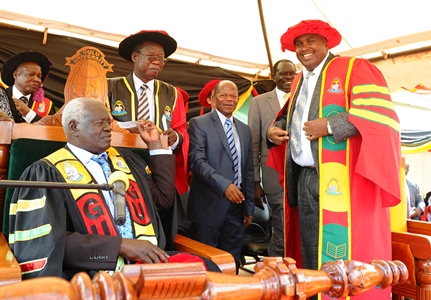 The department of Environment and Livelihood Support Systems, Faculty of Interdisciplinary Studies (FIS), MUST is partnering with the Department of Biology, Gulu University and KU Leuven, Belgium to implement a 4-year multi-disciplinary TEAM project titled “Analysis of past and projected future land use change and its impact on sediment fluxes in the Rwizi catchment”.
The department of Environment and Livelihood Support Systems, Faculty of Interdisciplinary Studies (FIS), MUST is partnering with the Department of Biology, Gulu University and KU Leuven, Belgium to implement a 4-year multi-disciplinary TEAM project titled “Analysis of past and projected future land use change and its impact on sediment fluxes in the Rwizi catchment”.
The project, with funding support from VLIR-OUS, starts on 1st January, 2018. The grant has a training component for 2 PhD students: one from MUST and the other from Gulu University.
You can click Here to download Details of Application Procedure and Criteria
Project Summary
Land use changes in rural Sub-Sahara Africa are in many cases unsustainable. They are often characterised by continuous expansion of farmland into marginal landscapes, causing severe degradation of soil and water resources. This project aims at exploring alternative development pathways for these rural areas by evaluating possible future developments for the Rwizi catchment in Uganda which can be considered a representative case-study because of its strong population growth and the rapid land degradation.
This project aims to facilitate the development of integrated watershed management: firstly, by strengthening the regional academic research capacity in this field through the training of two PhD-researchers from MUST and Gulu University (at KU Leuven, Belgium), and several postdoctoral researchers. Secondly, the project will develop fundamental interdisciplinary research that deepens the scientific understanding of bidirectional relationships between demographic developments and the degradation of soil and water resources and the ecosystem services they provide. Thirdly, these insights will lead to the development of an applicable agent-based model (ABM) that can simulates future land cover change and its impact on land degradation under certain policy-controlled boundary conditions. Such models, together with the local expertise to adapt and apply them, are much needed tools for the simulation of the effects of potential policy scenarios. After successful completion of the proposed project, the integrated watershed management of the Rwizi catchment could serve as a pilot-case for many other catchments in Sub-Sahara Africa.
Scholarship Benefits
The scholarship caters for tuition fees, research costs, air tickets, and a monthly stipend in Belgium. Half of each of the 4 years will be spent in Belgium with the other in Uganda, but with some minor variations.
Student Selection Criteria
A student from each of the local partnering Universities (MUST and Gulu) will be selected. The project is divided into two strands: the bio-physical and the socio- economic – although both will be involved in the computer-based simulations and scenario development.
- The student must be a full-time member of staff at MUST or Gulu University (a copy of the appointment letter will be required before selection).
- The student interested in the socio-economic strand will mostly work on migration and urbanisation patterns, land use change, and an integrated landscape transformation model. A master’s degree in Geography, Physics, Mathematics, Sociology, Computer Science, Land Use Planning, Environmental Science, and a relevant first degree from a recognised university are essential. He/she should also have a background in remote sensing, statistics, and programming.
- The student interested in the bio-physical strand will mostly work on mapping and simulation of spatial patterns of soil erosion and sediment transport. The sediment flux model will be linked to the land use scenarios in the integrated landscape transformation model to predict future levels of environmental degradation in the various parts of the Rwizi catchment. A master’s degree in Soil Science, Biology, Chemistry, and Physics and a relevant first degree from a recognised university are required. As this is a typical bio- physical modelling project, with some loose coupling of socio-economic variables, the student should have a strong mathematical and computer science background, and with excellent programming
- The student will be required to return and serve the home institution after the PhD studentship in Belgium. In this case, a support letter from the host department/institution indicating employment prospect of such a candidate will be an added
- Female candidates are encouraged to apply
Application procedures
Applications are invited from all eligible candidates from MUST and Gulu University. The successful applicant will work under the supervision of Dr. Ronald Twongyirwe (PI – MUST), Dr. Alfonse Opio (Co-PI – Gulu university), Prof. Anton Van Rompaey (PI – KU Leuven), and 4 other project team members from Uganda and Belgium.
The application should include a concept note (no more than 3 pages), a cover letter (1 page), a CV (2 pages), copies of academic documents (no more than 5 pages), the appointment letter (I page), and a statement of motivation (1 page). The application should be compiled into one document of no more than 13 pages in total. Kindly indicate clearly which strand you are applying for.
For applicants from MUST, applications should be addressed (and submitted) to the Dean, Faculty of Interdisciplinary Studies (FIS) by email: vnyakato@must.ac.ug. Ensure that the following are included in the cc: rtwongyirwe@must.ac.ug, jodongo@must.ac.ug, tolocas@must.ac.ug by 10th January, 2018, 2:00pm.
Applicants from Gulu University can submit their applications to the Head of the Department Biology, by email: malingageoffrey@yahoo.com/malingageoffrey@gmail.com. Copy in: alfonseopio@gmail.com/alfonseopio@yahoo.com by 10th January, 2018, 2:00 pm.
Interviews
The selection process will involve two stages – a pre-selection phase in mid- January 2018, and the final selection between 5th and 8th February 2018. Only short listed candidates will be contacted.
You can click Here to download Details of Application Procedure and Criteria

